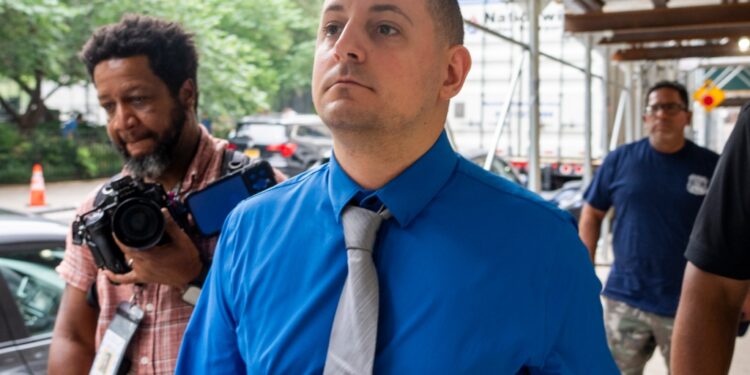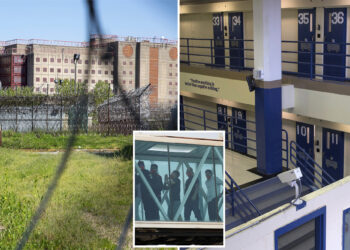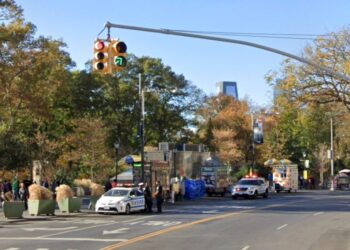With his indictment and prosecution of a cop who was trying to escort an unruly “customer” from a tony Manhattan tech emporium, District Attorney Alvin Bragg has sent the strongest signal yet that public disorder in New York City is a protected activity and official efforts to contain it will be treated with harsh sanction.
In October 2021, NYPD officers responded to a call from the manager of the Upper West Side Apple Store that someone was disturbing customers and causing a ruckus.
Cops reportedly spent 40 minutes trying to convince the lout to leave the store peaceably.
Officer Salvatore Provenzano was leading the foul-mouthed miscreant from the establishment when he evidently broke away aggressively.
Provenzano allegedly punched the troublemaker, who was not injured.
For the “crime” of quelling a public disturbance, attempting to keep the peace, and defending himself, the officer has been arrested, charged with assault, and suspended without pay from his job.
It’s tempting to call this case “shocking,” but really it’s in line with DA Bragg’s approach to Manhattan law enforcement.

Bragg, a Soros-prosecutor in the classical mode, typifies the progressive approach to crime — blame underlying social conditions for criminality, and throw the book at representatives of law and order.
Even before taking office, Bragg vowed not to pursue charges against a host of crimes, including trespassing, resisting arrest, and farebeating.
He promised to deal with serial shoplifting — now an infamous scourge across the city — by “establish[ing] a taskforce to work with mom-and-pop business owners, cure violence providers, community leaders, advocates and law enforcement to develop community-solutions and support services to this serious issue.”
That’s worked out great — just ask the clerk at the convenience store while he’s unlocking the shampoo shelf for you.
Bragg — who admits that he gets “a knot in [his] stomach” when his family rides the subway — nevertheless offers sweetheart deals to gangbangers and killers.
But as he said in his “Day One” Memo, “incarceration, in and of itself, can create public safety risks.”
This is the essence of the progressive philosophy of criminal justice — laws cause crime, and punishment begets harm.
Of course, Bragg has thrown the book at former President Donald Trump, indicting him on felony charges of having allegedly falsified business records — in his own, privately-held business.

This charge is so minor as to rarely be pursued at all, and only as a felony if it was undertaken in support of some larger crime.
In this case, regarding a payment to a porn star who was evidently extorting the President, Bragg is charging Trump with a campaign finance violation—a charge that the federal government declined to prosecute.
Bragg also sought charges against Jose Alba, the bodega clerk who defended himself against a violent thug, and only dropped the case when public outcry penetrated the thick walls of 1 Hogan Place.
And he is pursuing manslaughter charges against Daniel Penny, who restrained Jordan Neely with a chokehold on the subway in May.
Neely, who died, was frightening and threatening fellow passengers, and reportedly screamed that he was prepared to die.
The indictment of Officer Provenzano came the same day that the city settled a $13 million class action suit on behalf of 1,300 rioters (“protestors”) who were arrested during the looting, arson, and violent unrest that followed the 2020 death of George Floyd.
The message is being blasted to cops, criminals, and ordinary citizens alike:
Crime and disorder merit cash payouts and praise from the city’s elected elite and their collaborators in the media and non-profit sphere.
And public safety officers and foolhardy New Yorkers who imagine they have the right to self-defense face scorn, loss of income, and prison time for trying to do their jobs or protect their neighbors.
Agents of despair hoot with joy knowing that Officer Provenzano’s indictment will put thousands of cops in a defensive, reactive position vis-à-vis street chaos.
Alvin Bragg, as heinous as he is, remains but a symptom of the problem.
The body of New York City is wracked with a rapidly growing cancer of chaos and criminality, and until the people of the city shout that they’ve had enough, the cancer will continue to spread.
Seth Barron is managing editor of The American Mind and author of “The Last Days of New York.”

























